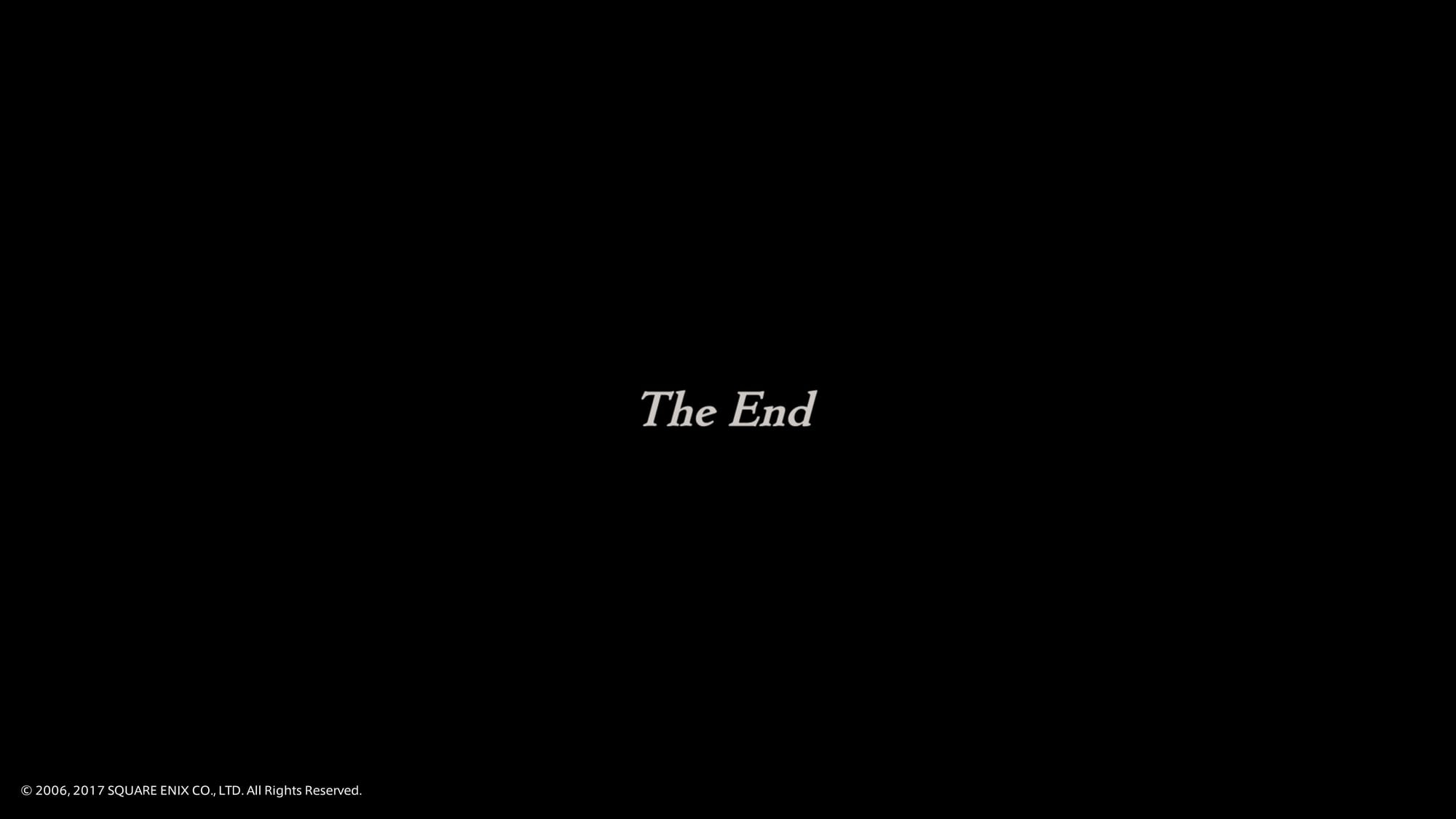Final Fantasy - PS2 Era (X, XI Online, XII) [Review]
Underwater sports, an MMORPG older than WoW (and still on) and the most blatant clone of Star Wars since FF4.
![Final Fantasy - PS2 Era (X, XI Online, XII) [Review]](/content/images/size/w1200/2025/09/FINAL-FANTASY-X_X-2-HD-Remaster_20250131005659.jpg)
As an anthology, the Final Fantasy franchise often reinvents itself very to find new audiences and styles. The PS2 Era may be the most experimental of it all, with 3 games that are vastly different from one another (and countless spin-offs that I won't review here).
While very popular, the PS2 Era somewhat marks the beginning of the end on the pace of mainline entries. The budget of the games skyrocketed with their ambitions, with FF XI being a pre-WoW MMORPG for PCs and Consoles with crossplay and FF XII being, at the time, the most expensive game ever to produce and develop.
This post will be… Probably the longest on the blog so far and will stay like that for a long time. It follows the PSX Era post, SNES Era post and the NES Era post. Well, let's finally enter the voice acted generation!
Final Fantasy X HD Remastered
As if defying fate, Final Fantasy X doubles down on its romance and setting, strongly ties the narrative to the progression of the main scenario and above all delivers an extremely well written story with amazing twists, unbelievable worldbuilding and super memorable characters in mostly gorgeous landscapes, an amazing progression system and one of the series strongest boss designs.
It is also a very, very long corridor without any kind of branching path, no dungeons whatsoever outside some silly trials, no overworld at all, bad side content pacing, somewhat tilted voice acting (it is the first Final Fantasy with voices after all), small and boring cities and too many random encounters, even considering the games that came before it.
So where is my heart when reflecting on this game? What is my story?
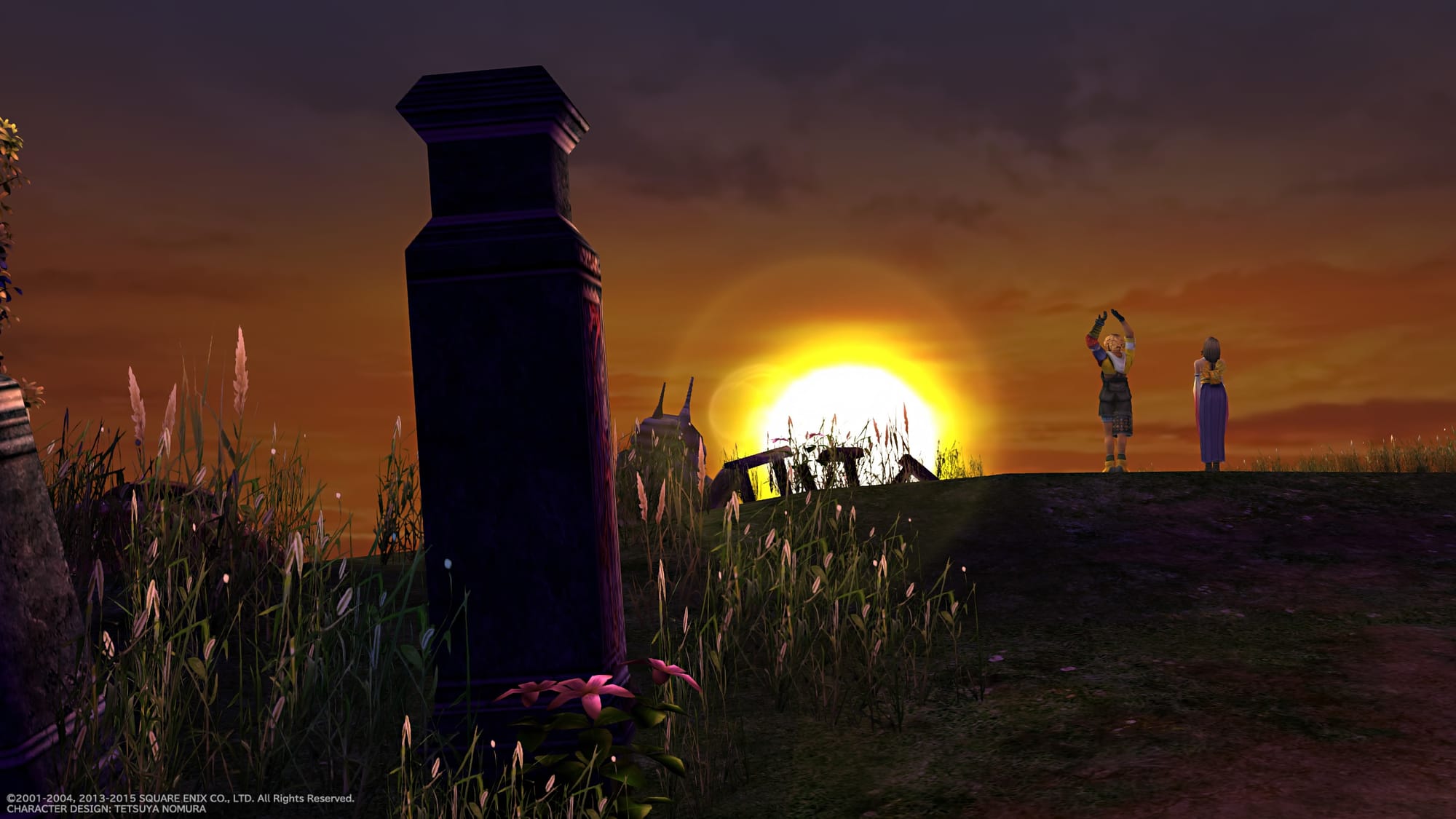
It is impossible to undersell how amazingly this game opens. In many ways, it sets the tone not just for the story that is to come, but what it means to have a big production value in video games without losing sight of its creative vision and uniqueness. As the death metal chaos accompany the surrounding destruction, the world is ending, and it was up me not get lost in all this confusion, to then finally hear a story told in this wicked, death filled and dreamy world that the main character Tidus (pronounced “tee-dus”, thank you) is about to enter.
The game knows that the beginning will be hard to keep it up and I felt a bit lost, but it was by design, as I the player was as stunned and confused as Tidus. This feeling such a bang of an opening is bold, and something that may only work in video games. It is not the first time that a Final Fantasy game wants to confuse the player to then explain the plot piece by piece later, but here it really feels that the “show, don’t tell” rule of storytelling was being followed by heart and it works.
FFX makes concessions to deliver its grandiose vision, though. It is story heavy, but also features a lot of battle content, and the exploration and pacing of the game is super weird and doesn't work all the time. The exploration is simply uninteresting for the most part of the game – it is pretty, for sure, but straightforward in a way that, frankly, the series never has been before.

This “on rails” feeling was lurking around the franchises for some entries, it is true: 7 and 8 on the PSX were already more linear than what was happening on the SNES era, and while FF9 tried to return to the old “overworld discoveries and explorations” feeling of the franchise, Final Fantasy X discarded this aspect altogether. This is the weakest point of this game by far in my opinion, but as the story really doesn't gave me a true reason to return or visit other places…
… The game structure, somewhat disconnected from the story, suddenly opens, close to the “end” of the game. After about 40 hours of walking exclusively in long wide corridors, I was presented with a “non-linear”, optional content to do that ranges in difficulty. This place alone, the Calm Lands, can take more than 100 hours to complete it, far exceeding the main scenario of the game. Here folks, was the second-worst aspect of the game.
The maps barely have any side content because all of it is cramped in the end in a surprising large amount, but it didn't work for me, as I'd have preferred to have side content throughout the game, and not only in this section before the conclusion.
The battle content here is very good most of the time. Again with some high highs, but, for me, low lows. It is superb that this is maybe the only Final Fantasy that I had to actually swap characters, as the bosses are super punishing and strong, and a turn isn't lost after swapping a character. This small change alone enhances the feeling that I was actually playing with all these characters, suddenly, I was deeply invested in leveling them up and knowing their strengths and weaknesses.
It is only 3 characters at the time, though, and the ATB system is completely scrapped. FFX joins 1 and 2 as the only games in the franchise to actually be truly turn based. And… I'm not too keen on it. I don't like how the pacing of battles can sometimes be too slow, there weren't moments where things were hectic and really chaotic, the feeling of desperation that some boss fights have had in the franchise prior.
That's why, here, these boss battles are the ultimate puzzles of the game. The boss mechanics are unique and probably the best in any turn based game, I had to think a lot about my next steps and consider all the boss strategies. It is super lame that most of the debuffs that I've got in the game aren't really useful on the bosses, but the difficulty is great and their designs always awesome.
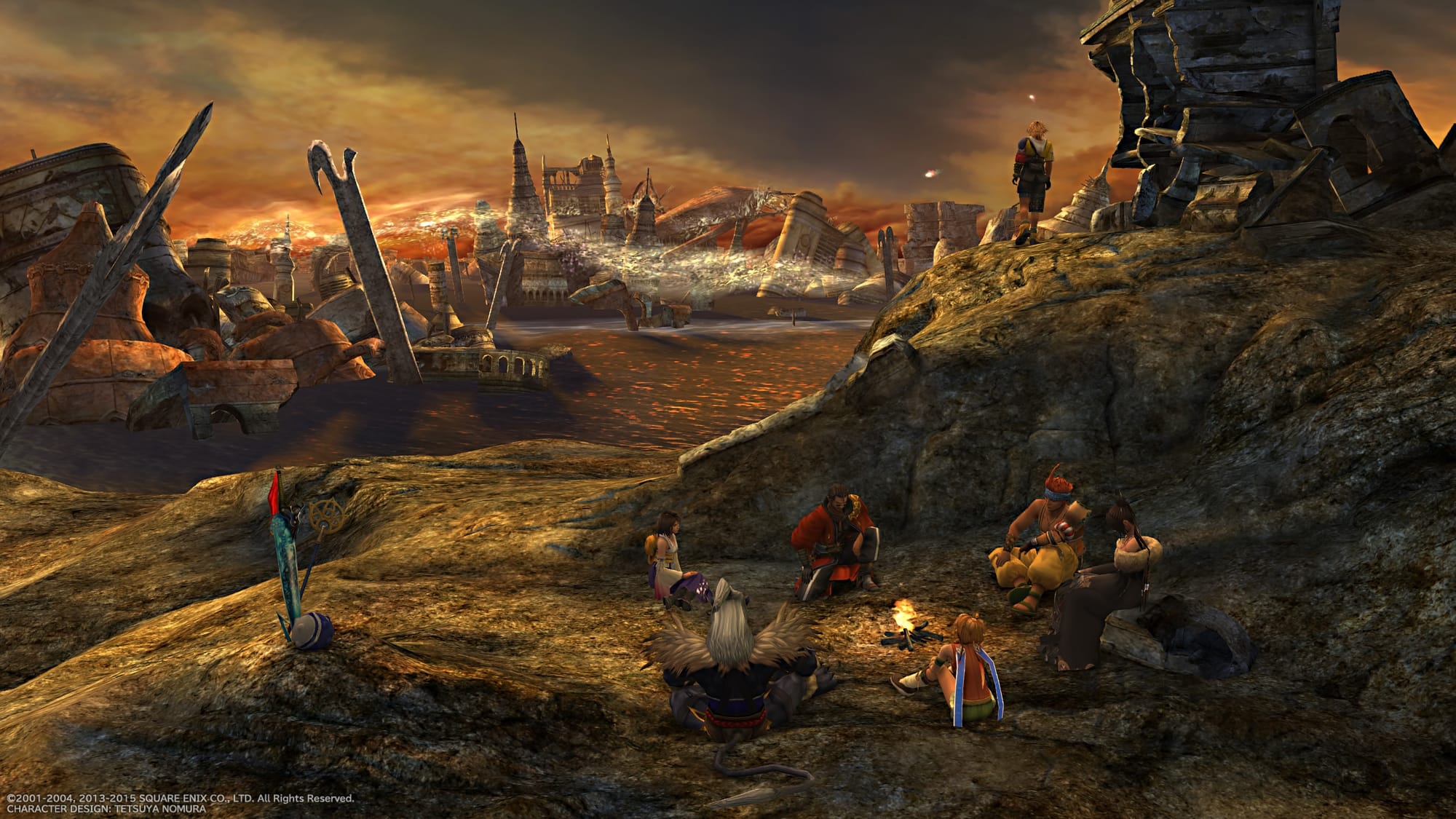
A more tactical and slower boss fight isn't a bad idea, but it is with the random encounters, that sometimes can feel boring and tiresome, with long unskippable repeated animations of common moves. There are several “firsts” in Final Fantasy here on the tenth entry that tries soothing the dullness of random encounters: I didn't need to resuscitate characters after battle, the save points fill the whole life without the need of an item, and also it isn't needed to cure statuses effects outside of battles, but, honestly, it doesn't help much and in the end not having random encounters – having the monsters on the field – should have been the choice here.
FFX is and was iconic, and a great game, because even when considering all its flaws, it still delivers so, so much and can be so memorable regardless of when or where is played it. I liked this game as much as 7 and 8, and while I won't return to Spira to play X-2 right now, as my FF marathon continues on the next title, I definitely will return in the future to then hear Yuna's story – she deserves it.
8.5/10
Final Fantasy XI Online
Always elusive, Final Fantasy XI was one of the weirdest game experiences that I've ever had, and it seems that it was by design. It is a preserved vision of the future as it was imagined in the early 2000s. A time-capsule from the login process to the configuration and settings, impressively, all still available to this day.
My story with XI is both old and very recent. As a dumb teenager, in 2012, I've decided to purchase Final Fantasy XI Online Abyssea Edition on Steam without prior knowledge of how to activate the account (a credit card is required) or even how to properly configure PlayOnline. After “installing” the game and not being able to open it, I've forgotten about it and never returned to it.
Come 2024 and this FF marathon, then. Between these twelve years since, I'm not only older – a perk of the linearity of time, of course – but also less dumb. After some trial and error, I've managed to get back my Square Enix Account tied to the Product ID that I've purchased, and then, finally could fix my SE Account.
After some more headaches installing and actually configuring the game and some basic mods, I've decided to let XI be my “side game” while I was playing through all the other FF in the marathon. For this month (which I won't renew, at least now), I've done almost all the Nation Questline of Bastok – stopped at the last one, which would be the beginning of the first expansion. So basically all the "base game" before the Rise of the Zilart Expansion.
So what about the game, then?
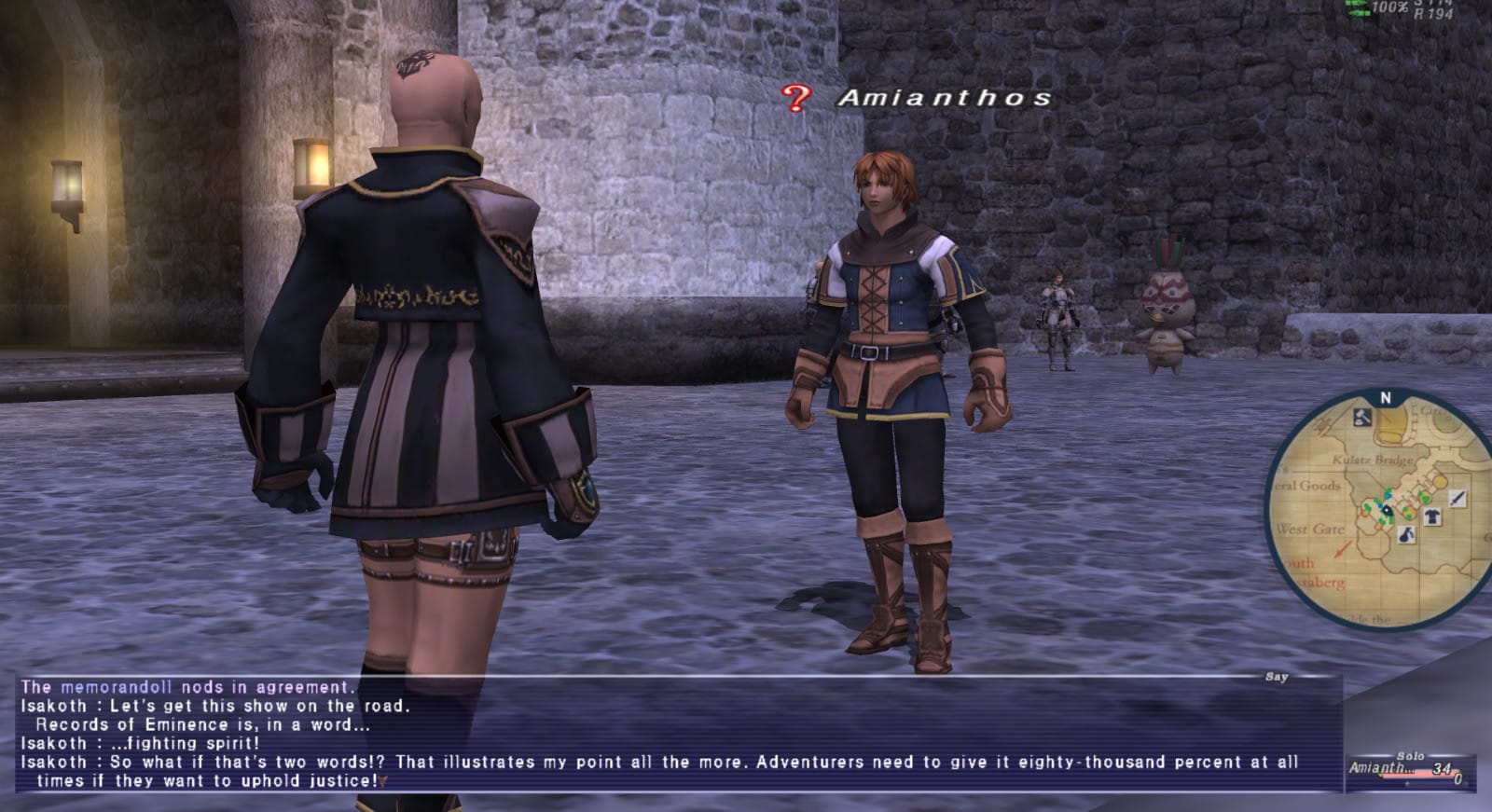
It is a beautiful, ugly, weird, unexpected and quirky mess. A perfect mixture of the biggest studio ego in the world and tons of money to try something new. There's simply no other game like XI. It starts already very controversial: it has the very divisive job progression of FF3, that is, you need to use swords to level up swords, evade to upgrade evade and so on. Your job level is not really that representative of your strength.
As a recent arrived adventurer, Amianthos (my Hume character's name), after deciding to have Bastok as his home, started his career climbing the City Ranks to understand more of his surroundings, while amassing fame and relevance across the peoples and places of Vana'Diel ('fame' is a hidden gauge, earned by doing quests, that will unlock new quests). The peacetime is endangered by the return of the Shadow Lord that seems to be behind all the unrest with other races across the lands, and gaining notoriety puts Amianthos in more and more complex situations.
It is not long to have other important side characters around you. Lion, the most Tetsuya Nomura design I've never seen, give hints on a plot that seems deeper than what it is on surface, while big names like Aldo (the kid from the opening cutscene!) invited me to a very interesting rebel group. With themes of prejudice, racism and compassion, FF XI actually creates good drama between some of its ideas, but this base game is above all set up and world building to all the expansions that are to come, with the player, their side characters and the group that seem to want peace between people and beast tribes.
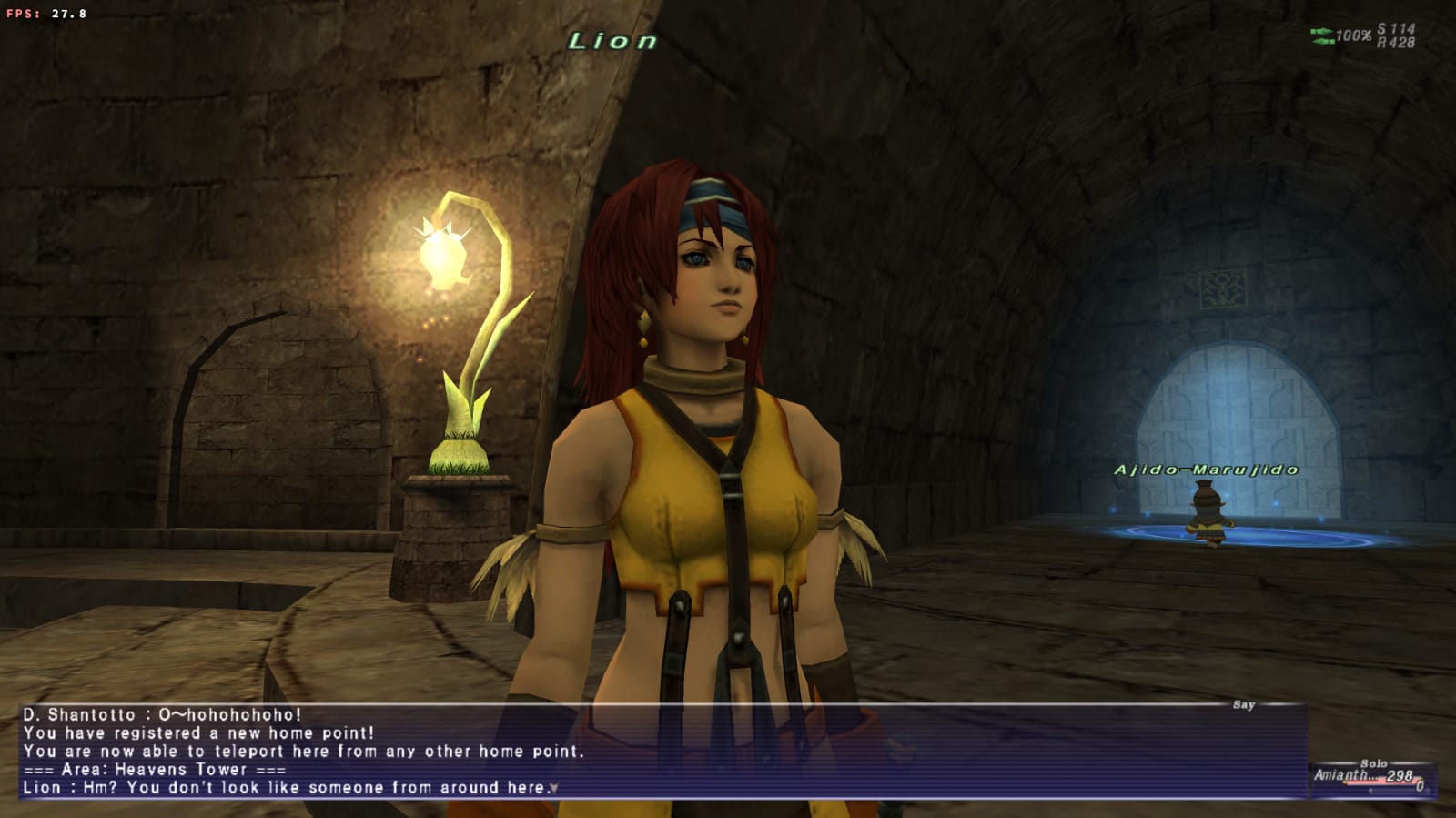
Final Fantasy XI is an online medieval immersive sim experience. I've got to trade items with NPCs (using the same trade interface used with other players), buy maps (that are, sometimes, with holes in it), wait real world hours, sneak around places, search for items to cloak myself in oil to make me silent and walk unnoticed. I needed to traverse the world by foot and (eventually) by Raptor. Likewise, I got a chocobo egg that needs 4 real life months to hatch. I'vev met the twin port towns of Selbina and Mhaura where the ferry that travel between then take about 19 real life minutes to complete and the biggest and most eventful cities that the franchise has ever had, even considering the games after it – I'll never forget finally acquiring my airship travel pass after one of the most difficult quests I've ever done in an RPG.
It is also champion of many firsts in the series: no more random encounters, all enemies are now on the field; multiple battle themes, wide and open fields to walk around, first to have an interconnected overworld between cities. It is basically the vision of FF1~3, but online and 3D and with real time slow but punishing battles. A monster requires more than one player to beat it, but with the “Trust” system, it is possible to summon other NPC warriors that aid us in battle.
Everything is punishing, far away and expensive, and it is a game that made me interact with many systems and maps to get to one mission with no reward other than progressing the story. I've fortunately created a friend – Rykon I'll never forget you – that gave me 100k gil and then made it possible for me to progress through the main scenario. Side content is very similar to what games have been before, with chocobo raising, racing, and monster catching. The sidequests are somewhat similar in structure as the ones in FF8 and FF10. It is more FF than MMORPG.

In the end, it is a lot about the journey, traveling through clunky controls, menus, and boring (but intense) battles to see nice landscapes, ugly textures, a lot of different monsters and interact with the world in unique ways, with fun minigames and cool ideas that reinvent what a PSX/PS2 Final Fantasy could be but online. It is impressive to see it preserved, even in all its quirkiness.
In my mind, if this game was an offline release with this scope, big maps and complex systems, it would've been the best FF on the PS2, because FFXI is an innovative and frankly futuristic and experimental game, and it is a miracle that still exists today and could have its story finished after more than 15 expansions.
To accommodate different control schemes and frankly invent some new types of gameplay scenarios, being online in the end kinda drags everything down – the auto attacks are not that engaging, the requirement of 4 player + parties makes everything too granular and difficult to really measure progress (even with the “Trust” system, that I've mentioned) and some missions aren't balanced by design to make me search for other players and online guides.
Maybe I'll return on the next Free Login Campaign now that my 30 days are over to start the Rise of Zilart. What I know is that the Shadow Lord, Aldo and Lion are nicer characters than I've imagined and that Vana'Diel is one of the most unique and special places gaming ever had.
This game was also played on Linux :)
7.5/10

Final Fantasy XII - The Zodiac Age
A lot of people have a lot of opinions about Final Fantasy XII, even those who never played it. Many things in this game can have that feeling of “love it or hate it”: the art style is completely different from most of the series, as is the gameplay and storytelling, more akin to an epic and larger than life blockbuster movie.
Confined to the technology of the PlayStation 2 and released in a time when the 360/Wii/PS3 were already on the market in some regions, FF12 sets one clear goal: be as expansive in its world as the games from the SNES era but with the structure of a 'modern' title.
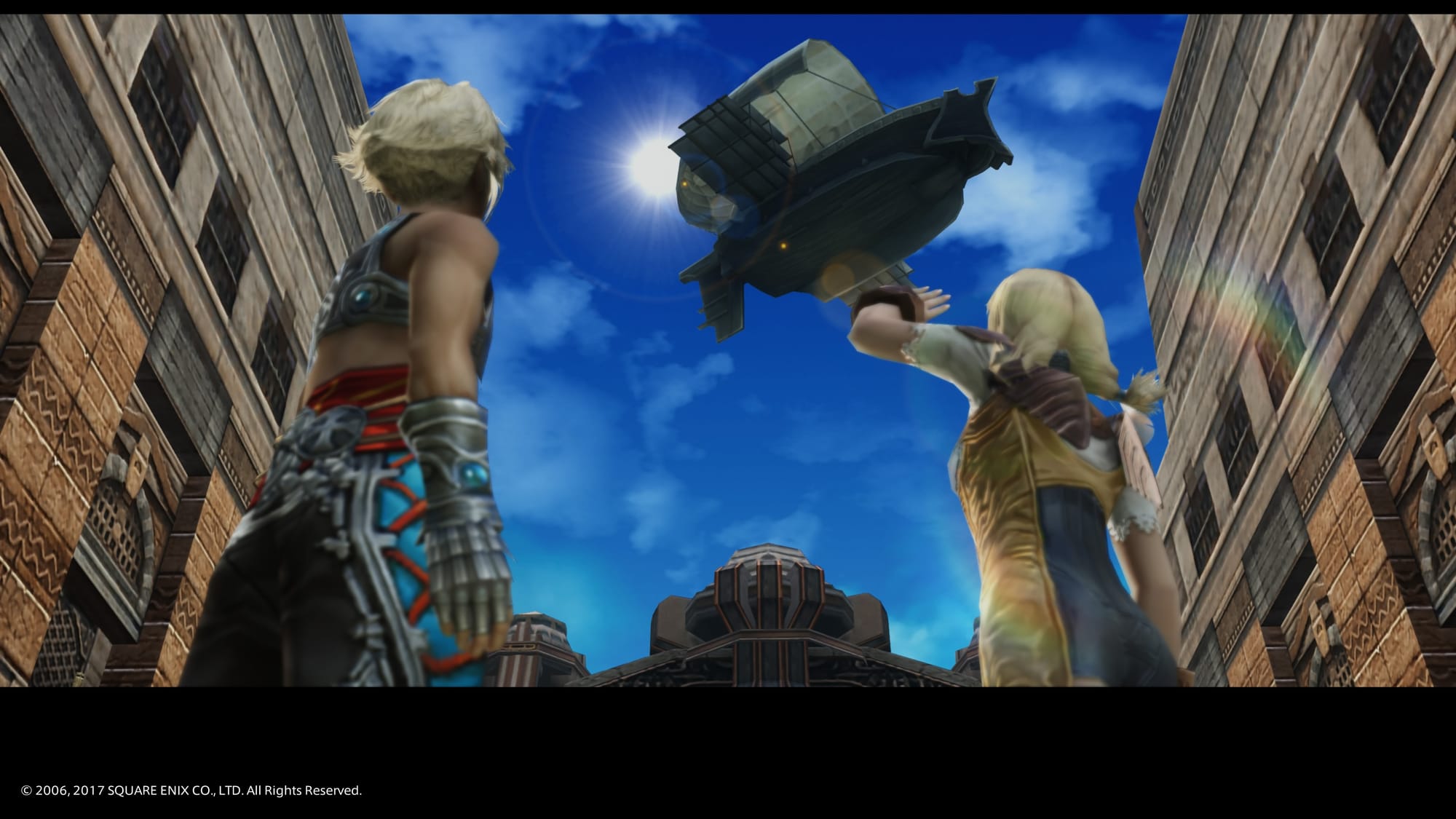
In retrospect, FF12 was the reason the franchise stopped with its unrealistic cadence of releases. From the first game in the series to the eleventh, it was about 15 years - from the 11th to the 12th alone was almost 5 years.
The thing is: while FF11 Online had a hard drive requirement that could actually implement its larger maps and vision, even if the game was too quirky and weird for the time (and only available at restricted markets). XII had the same constraints as X: being limited to physical media storage. This alone, paired with the compromise of the PS2 hardware, made 12 a very costly game to produce, and took way more time than any other game in the franchise (as of its original release on PS2).
The jump in quality of the presentation and world vision between X and XII is palpable. Now, almost all the maps and cities are interconnected, with different large areas to explore, filled with quests, camps, sellers, hunts, and secrets. Tons of optional dungeons, presented to the player early in the game, paints a picture of what's to come: you're level 10, lost, without a map and entered a cave with level 45 monsters – two conclusions: I need to get away from here ASAP, and I'll return here in about twenty hours.
This connected places between cities and dungeons, as the game progresses, gets a bit less grandiose; more and more maze-like spaces and long corridors starts to appear. Even in those, branching paths are presented, and optional dungeons with optional Espers (this game Summons) and gear as the rewards.
While the PS2 (and PS3 Backwards Compatibility) couldn't really filter the textures of this game, so on original hardware everything was really shaky and blurry, the Zodiac Age version makes everything super clear – the presentation is superb, and as good as any modern game: the lip sync is visible, as is the character's eyes and subtle expressions, everything is really well animated and the motion captured movements of the characters in and outside cutscenes are superb.
Not only this: there's a weather system with rain, sandstorms, sunny and cloudy days. And while the big cities of the game escape this grandiose vision of the world map, and have a more scripted and static vibe, they are big, and often have layers and little quests or hunt progressions in every area of the segmented spaces that represent them. Again, you can see that the cities get less impressive as the game progresses, as there's not really another city as cool as Rabanastre, the first one. Either way, all of them are filled with quests and hunts and different peoples and npcs so they're interesting, and, well, it is nice to go from city to city in an RPG, passing through caravans and wild monsters.
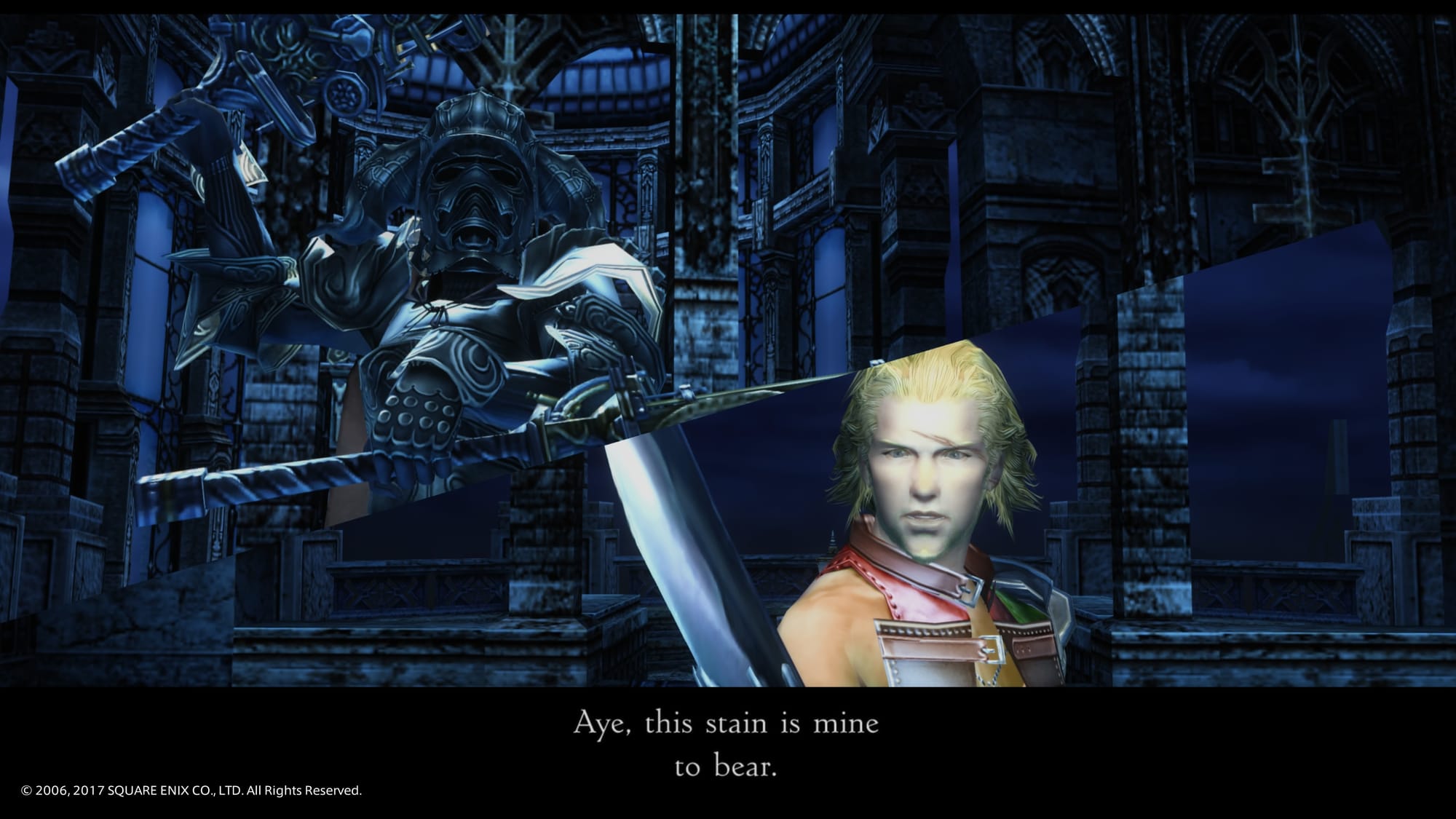
It is hard to deny some allegations, though: the game does indeed share similarities with Star Wars – be it on the aesthetics of the prequels and many story bits of A New Hope. It is a search for the next Magic Item that will Solve Everything as well. The battle system can be confusing and while it is enjoyable to tailor what each party member will do with automated actions, “the Gambit System” it is too granular, and I can see how some people can sometimes die multiple times just because they didn't properly configure their Gambits (these said automatons).
I basically needed to create situations that my party would perform at the same time that I needed to constantly change between the 3 active members and position myself closer or farther from the enemy and input specific and more powerful abilities or items when needed. The original release was fairly slow paced, but the 3X and 4X modes on the Zodiac Age makes the trial and error more fun. The battles can be chaotic when is needed to manage the characters, gambits, positions and the many, many debuffs, old and new, to win each battle. Oh! Finally: no random encounters, everything in real time and on the fields!
The summoning and limit break systems, here called Espers and Quickening, respectively, are a miss and stop the flow of battle just to have a flashy, bright and overly produced cutscene with results that aren't really that good in battle. There's a feeling of overproduction in FFXII sometimes, with immense maps that, while often filled with interesting monsters and optional bosses, there are moments in which they are empty and just big for the sake of being big. Maybe FF12 also has the largest amount of side content, and it is evenly spread throughout the game, something that is rare in this franchise to be honest. In this playthrough I only focused on the optional Espers and some really good weapons (that, frankly, are most of the time in chests) and really didn't finish all the side hunts.
The other returning system is the Grid Sphere from FFX! Well, more or less: now in the License Board, each character can choose up to 2 jobs and then completely unlock abilities, gear, passives, and skills for these 2 jobs, fully. There are 12 jobs in total, and I really love this system, and it is my favorite progression in all Final Fantasy titles. I really created a specific job for each of my party members that here, again, can be changed during battles (actually, I could swap party members, gambits and gear during the battle, even with bosses).
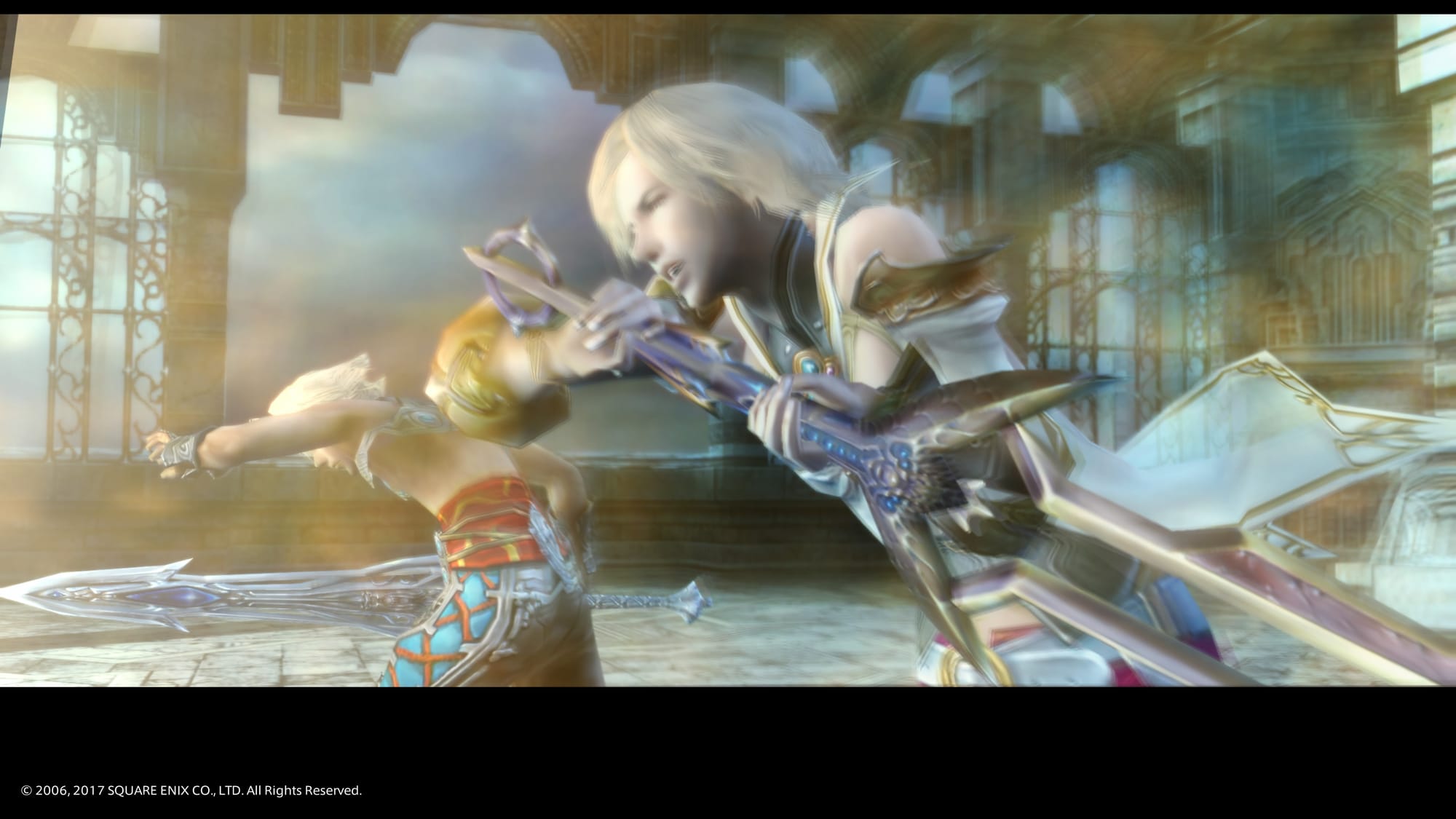
While the overarching story can be sometimes a bit too silly, like characters holding personal items even after being imprisoned or the hunt for the next McGuffin; the characters are amazing, each one represents something important and relevant, and they are so different one from another that it is nice to see them grow together and become true friends. Also, the worldbuilding and its futuristic take on medieval warfare is super impressive and unique. There's lots of hate on the player controlled character Vaan, but honestly, he's fine, and not every game needs to have the player as the center of attention. It is nice that Ashe is the protagonist, and she's one of the coolest characters in all Final Fantasy.
So, all in all, great characters and world, chaotic and fun battle system, big cities, interconnected maps, optional dungeons and bosses, cool unique gear and job progression. Things I love most on Final Fantasy, and that were missing from some of the previous titles, are here. Of course, the game has flaws, many really, and the Zodiac Age handles the system mechanics, interactions, battles, and visuals waaaay better than the original release. The Zodiac Age feels like this is what FF12 should always have been. And it is a stellar gamer that I couldn't recommend it enough.
9/10
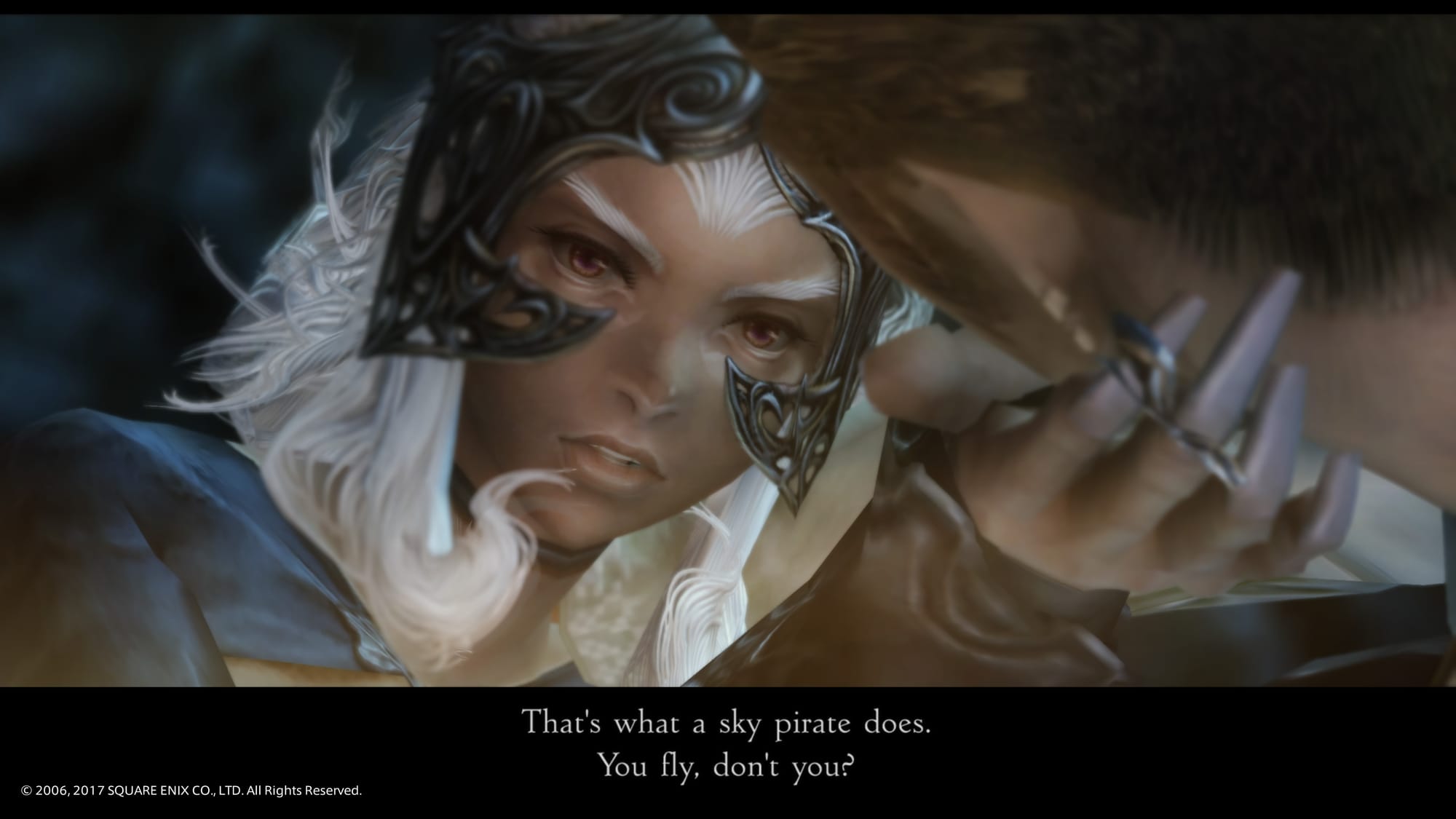
So that's it! The PS2 mainline games are finished here on the blog.
After XII, FF had big identity and budget crisis, Square fully became Square Enix and several corporate restructures happened that resulted in weird plans for the franchise. Effectively, the PS3 Era is only FF XIII, FF XIV (1.0) and FF XIV ARR (2.0) on the mainline entries, two of them being the worst received games on the franchise.
While I've returned to 13 on the marathon (and it is the last remaining text to be brought here from my backloggd), XIV 1.0 is currently unaccessible and I don't see myselft doing a PS3 Era post, but maybe one alone for XIII.
Bye~
